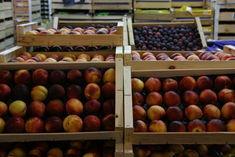
Trade body Freshfel Europe is warning that this year’s stonefruit season on the continent will be the third “difficult” campaign in a row while grower groups in individual producer countries say it is too early to tell and counsel against alarmism.
Continent-wide production forecasts for peach, nectarine, and apricot production were announced at the annual Europech’ conference last month and pointed to a reduced crop in France, Greece, Italy and Spain - a situation which would usually lead to a strengthening in price.
However, Freshfel reports that the European Commission’s forecast working group on peaches and nectarines is fearful that market conditions are already challenging even this early in the season and that there could be a knock-on effect across the fruit category.
Growing conditions this year have been particularly affected by the cold winter and spring and it is the cold in particular that is leading to a significant delay in the start of the season for the earliest varieties as well as a smaller size profile on average. Paco Borrás, vice-president of Freshfel’s export division and sales director at Spanish produce behemoth Anecoop, said: “The later start of the season will lead accordingly to a shorter marketing season, and might also lead to an overlapping between the early and the mid-season varieties. We are clearly moving towards a congestion of the market. Having a lower EU production will not be beneficial as the total sales period will ultimately be cut by two or three weeks, while smaller sizes might have an additional downward-spiralling effect on prices.”
But not everyone agrees. Emmanuel Demange, director of the French national fruit producers’ association told freshinfo: “We are just watching the markets and there is no need to be alarmist at this stage. None of the main producer countries have had optimal growing conditions and it is possible that fruit will overlap, but it is really the mid-June to mid-July period we need to watch out for. In France we have started the cherry harvest already and we definitely have less product than last year. Apricots are just starting their harvest now, two weeks late. But will all the varieties come on stream late or will they bunch up? We just don’t know that yet.”
At the Hortiberia group in the Spanish region of Murcia, director general Fermín Sánchez Navarro is bullish about the season so far, which is starting with a forecast 18 per cent reduction in volume. He said: “Prices are higher than in previous years which is very positive. The rains and frosts in earlier months of the year endangered the season, but in the end they have only served to delay it and fruit characteristics and quality should be very similar to last year. Prices are giving us hope that we will not see a repeat of the ruinous returns of the last two seasons.”
Freshfel is critical that despite the negative reports from the last two seasons, the European Commission has still not introduced adjustment mechanisms to cope with severe crisis situations. Several grower organisations called upon the European Commission to introduce such mechanisms, which if adopted quickly could partially alleviate the pressure on the market. To stabilise the market further, Freshfel wants other additional tools to be considered, such as an increase in processing capacity.



